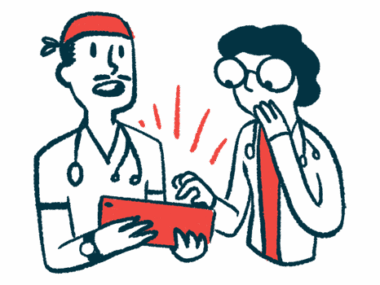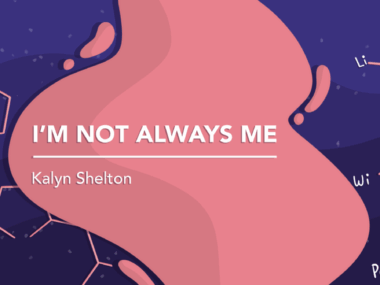Why I wrote a job description for living with acute porphyria
Managing a rare disease involves skill and full-time work, this writer says
Written by |

Many aspects of life with acute hepatic porphyria (AHP) are a difficult adjustment. It was hard to get my diagnosis and accept that I’d have frequent attacks. It was hard to deal with periodic hospitalizations and medical PTSD.
But it was only when I realized I could no longer pursue my career that I crumbled to dust. Blowing in and out of each day, listless and directionless, I was numb. I was full of shame, and struggled to find a purpose.
When I no longer had a full-time job, I woke up every morning confused about my purpose and lacking clear vision. Between severe symptoms, energy deficits, and randomly scheduled doctor appointments, my life felt inconsistent. I struggled to develop a routine.
Our society rewards self-sacrifice for the sake of getting ahead. Before I was diagnosed, I overscheduled and stayed busy to prove that my mysterious symptoms didn’t have power over me. I got really good at dissociating from my body, simply by not allowing the space necessary to feel my feelings.
My brain likes to focus on the big, open weekdays that stretch out in front of me like roads that come to a distant point. Where once these days were filled with time at the office, now there’s stress to plug in meaningful activities. Too much space and flexibility comes with suffocating anxiety.
These thought patterns are exhausting. They’re holdovers from my overachieving, workaholic past, and they’re not doing me any favors. In recent years, I’ve worked with my therapist to embrace the space in my own way, to pause and remind myself that rest is productive. But on the days I remain unconvinced, I need to change tack.
The responsibilities and duties I prioritize in my life don’t take place in an office, or under an employer’s supervision, but they still equate to what feels like its own type of full-time work. That’s why I developed the following job description.
Rare disease experience expert
Rare disease experience experts are practicing being human in bodies that hurt or may not function optimally due to symptoms of a genetic condition. First and foremost, they listen to their body’s needs, and then they perform tasks to manage their symptoms that day.
Their duties and responsibilities include, but are not limited to:
- Physical demands include caring for the body, consuming a healthy diet as recommended by healthcare providers, getting adequate sleep, practicing movement or exercise as symptoms allow, conserving energy, taking medications or supplements as prescribed, and responding to illness appropriately.
- Mental demands involve caring for the mind, obtaining psychological or psychiatric help as needed, practicing a regular meditation or mindfulness activity, maintaining regular social engagements, going outside every day, and pursuing hobbies.
- Communication happens regularly with a primary care physician or other “home base” doctor to foster an open and trusting relationship. Also necessary are scheduling and attending doctor appointments at recommended frequency, obtaining referrals to specialists when needed, and seeking out specialties for treatment of symptoms, including new and experimental therapies.
- Administrative tasks include organizing medical records, filling prescriptions, obtaining and maintaining adequate health insurance coverage, submitting information for health insurance appeals as needed, paying medical bills on time, and obtaining and maintaining state and federal government benefits as qualified.
- Experimental duties involve seeking out nonmedical approaches to symptom management, such as massage therapy, chiropractic care, acupuncture, or self-care products.
- Research means staying up to date on the latest studies and scientific findings related to disease, including opportunities to participate in research, and attending conferences when able.
- Relationship-building requires seeking out personal relationships among peers in the AHP, chronic illness, or rare disease community.
- Volunteering includes connecting with patient organizations (both disease-specific and general rare disease nonprofits) and getting involved as able.
- Advocacy is sharing a personal story publicly when ready.
For anyone on long-term disability who feels shame for spending weekdays alone in their home, here’s a gentle reminder: No one is judging us as hard as we judge ourselves. We never aspired to be a person with AHP, so it can be hard to see the value in the skills and abilities we’ve developed to navigate our disease.
I urge you to take stock of the highly specialized knowledge you’ve acquired by living with, or caring for someone with, a chronic condition. Write a job description for where you’re at right now. Challenge your lingering capitalist thought patterns and recognize your self-worth in a new way.
Note: Porphyria News is strictly a news and information website about the disease. It does not provide medical advice, diagnosis, or treatment. This content is not intended to be a substitute for professional medical advice, diagnosis, or treatment. Always seek the advice of your physician or other qualified health provider with any questions you may have regarding a medical condition. Never disregard professional medical advice or delay in seeking it because of something you have read on this website. The opinions expressed in this column are not those of Porphyria News or its parent company, Bionews, and are intended to spark discussion about issues pertaining to porphyria.






Leave a comment
Fill in the required fields to post. Your email address will not be published.